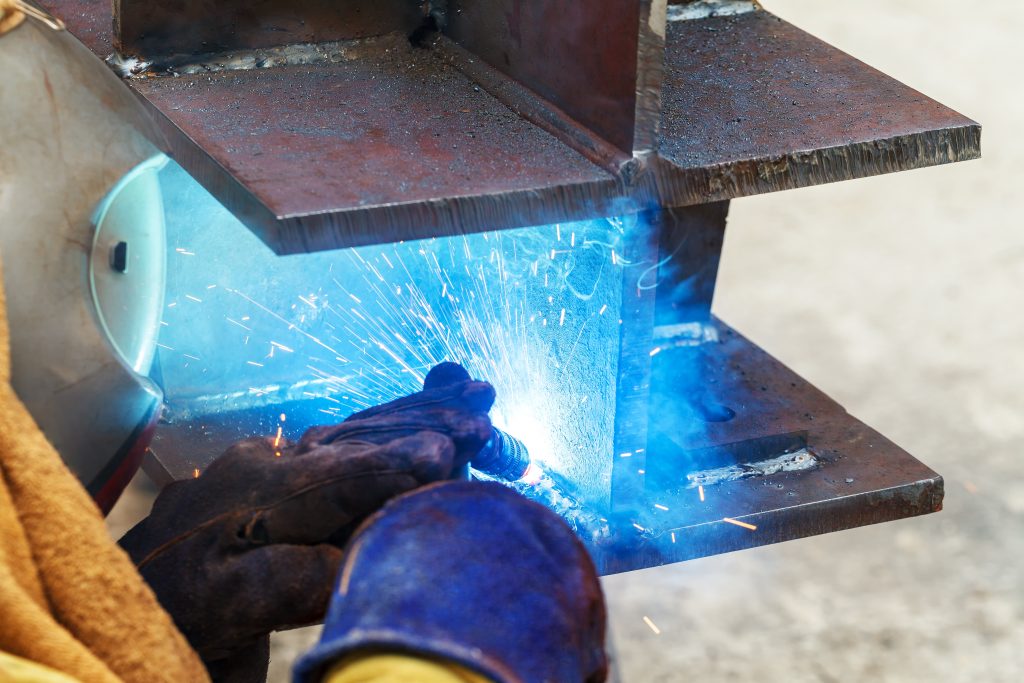Welding and Fabrication

Welding and Fabrication
City & Guilds Level 2 2850-24 Diploma in Welding and Fabrication
This course is aimed at learners who work or want to work as fabrication, pipefitting and welding engineers in the engineering sector.
Is this course right for me?
The demand for welders, fabricators and pipefitters has seen a significant rise and earning potential has continued to increase. Pembrokeshire has recently seen exciting developments within oil and gas and the growing renewables sector show that there will be a significant need for skilled welders, fabricators and pipefitters for many years to come.
What are the entry requirements?
- There is normally no direct entry to this course, you would need to progress from the successful completion of previous level in this subject area or similar
Current student - what are the entry requirements?
- Successful completion of relevant Level 1 programme (including skills) and decision from progression board meeting
What will I learn?
The course will be made up of the following modules:
- Working in engineering– This unit covers the underpinning basic skills and knowledge needed to function in engineering or manufacturing sectors. It covers the need to recognise and use safe working practices, consideration of the environment and working effectively as a part of a team. It includes the methods of communication that engineers use in their everyday.
- Principles of engineering technology– This unit is concerned with the basic principles of mathematics and science, along with the materials technology that underpin engineering applications. It covers common applied engineering calculations and materials selection in terms of types, common forms of supply, properties and methods of changing their properties.
- Principles of fabrication and welding technology– This unit is concerned with the technology that underpins fabrication and welding processes. The unit covers the basic principles of welding, fabrication materials, weld symbols and terminology, distortion, weld defects, heat affects of welding, forming allowances and non-destructive and workshop testing
- Welding by MIG process– This unit will enable metal inert gas (MIG) welding skills to be developed to meet the defect acceptance requirements of BS 4872 part 1. The applied knowledge topics include: health and safety hazards and methods of avoiding them, preparation, electrical requirements, consumables, welding techniques, welding positions, distortion control and rectification, BS 4872 part 1 requirements and non-destructive and workshop testing.
- Welding by Manual Metal Arc process– This unit will enable manual metal arc (MMA) welding skills to be developed to meet the defect acceptance requirements of BS 4872 part 1 in steel or stainless steel within its scope. The applied knowledge topics include: health and safety hazards and methods of avoiding them, preparation, electrical requirements, consumables, welding techniques, welding positions, distortion control and rectification, BS 4872 part 1 requirements and non-destructive and workshop testing.
- Fabricating thick plate, bar and sections– This unit is concerned with the underlying process technology associated with the fabrication of thick plate bar and rolled sections, in terms of: cutting, forming, assembly and joining of thick plate bar and rolled sections fabrication. It covers health and safety hazards associated with cutting (including oxy-fuel gas), forming, assembly and joining of thick plate bar and rolled sections fabrication.
You will also be expected to attend regular tutorials.
Will I need to study additional English & Maths skills?
You may need to study an additional skills course depending on:
- the course you are taking at College
- what grades you gained in your GCSE Maths and/or English Language
Click below to find out what skills course you may be taking at College.
If you are studying a Workbased qualification:
- Essential Skills Wales (ESW) in Application of Number and Communications, for Progression pathway programmes within the Built Environment Faculty only
All other courses:
- Upskilling Destination Programme – an hour and half session a week developing essential research skills, critical thinking, and academic writing techniques, supporting literacy, numeracy, digital literacy and employability skills
If you are studying a Workbased qualification:
- Essential Skills Wales (ESW) in Application of Number and Communications, for Progression pathway programmes within the Built Environment Faculty only
All other courses and those who have progressed through the internal progression route:
- A one year GCSE Resit Programme in GCSE Mathematics Intermediate Tier (Welsh or English medium) / GCSE English Language
If you are studying a Workbased qualification:
- Essential Skills Wales (ESW) in Application of Number and Communications, for Progression pathway programmes within the Built Environment Faculty only
All other courses and those who have progressed through the internal progression route:
- A one or two year pre-GCSE upskilling course in required subject/s – The priority of this programme (Foundation Maths for Mathematics pathway) is to build fundamental skill and knowledge, to prepare learners for progression onto the one-year, intermediate tier resit programme.
If you are studying a Workbased qualification:
- Essential Skills Wales (ESW) in Application of Number and Communications, for Progression pathway programmes within the Built Environment Faculty only
All other courses:
- A one year pre-GCSE upskilling course in mathematics – The priority of this programme is to build fundamental skill and knowledge, to prepare learners for progression to the Foundation Maths programme.
If you are studying a Workbased qualification:
- Essential Skills Wales (ESW) in Application of Number and Communications
All other courses:
- Upskilling Destination Programme – an hour and half session a week developing essential research skills, critical thinking, and academic writing techniques, supporting literacy, numeracy, digital literacy and employability skills
- A one year GCSE resit course in required subject/s
- Essential Skills Wales (ESW) in Application of Number and Communications, for Progression pathway programmes within the Built Environment Faculty only
For English:
- A one or two year pre-GCSE upskilling course in required subject/s
- Essential Skills Wales (ESW) in Application of Number and Communications, for Progression pathway programmes within the Built Environment Faculty only
For Maths:
- A one year GCSE resit course in required subject/s
- Essential Skills Wales (ESW) in Application of Number and Communications, for Progression pathway programmes within the Built Environment Faculty only
- A two year pre-GCSE upskilling course in required subject/s
- Essential Skills Wales (ESW) in Application of Number and Communications, for Progression pathway programmes within the Built Environment Faculty only
Learners studying on a Jobs Growth Wales (JGW+) programme will be timetabled into literacy and numeracy sessions. To discuss the opportunity of attending a GCSE resit programme, in addition to their JGW+ timetable, please contact skills@pembrokeshire.ac.uk
Can I do this course in Welsh?
Learners have the option to complete course assessment/assignments or elements of the course through the medium of Welsh or bilingually. Visit our Welsh Language in the College page to find out what else is available to you.
How will I be assessed?
- Continuous assessment during the course
- Portfolio of evidence
- Practical examination
- Written examination
What can I do next?
Successful completion of this course could lead to a Level 3 Welding or Fabrication programme or an advanced Welding or Fabrication apprenticeship. A high percentage of learners achieve apprenticeships after this one year course.
Do I need to bring/buy any equipment?
- Stationery - you will be told about any specific items before you start the course
- Engineering flame retardant coveralls - £35
- Engineering safety boots - £14/£35
- You may be eligible for funding. Find out more on our student finance page
Any costs above are approximate and may change.
Are there any additional costs?
- No tuition fee
- We are waiving the Administration Fee for the academic year 2025/26
- You will need to pay a £85 engineering workshop fee each year before you start the course
- You can rent a locker for £10 per year this will be refunded if the locker remains undamaged and keys are returned
- You may be eligible for funding. Find out more on our student finance page
Any costs above are approximate and may change.
Additional information
| Level: | |
|---|---|
| Mode: | |
| Duration: | 1 year |
Sports Academy: While on this course you may be able to join our Sports Academy, if you have a talent for sport, find out what we offer on our Sports Academy page.



